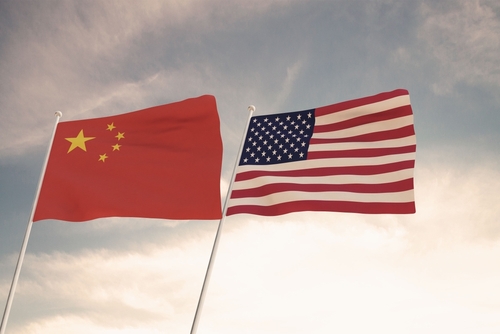President Trump’s bold “Liberation Day” tariffs have triggered a fierce retaliatory response from China, which announced a matching 34% tariff on all American imports. This escalation marks a critical battle in Trump’s campaign to end decades of unfair Chinese trade practices and protect American jobs. At the same time, global markets nervously watch this high-stakes economic showdown.
Trump’s America-First Trade Strategy Provokes Chinese Retaliation
China’s Ministry of Finance announced sweeping 34% tariffs on all American imports, mirroring President Trump’s recent tariff actions against Chinese goods. The Chinese government also took additional punitive measures, adding 11 American firms to their “unreliable entities list” and placing 16 U.S. companies on export control lists restricting their ability to do business in China.
China will impose 34% tariffs on all US imports starting April 10.
This comes after Trump announced an additional 34% tariff on all Chinese goods imported into the US. China called the US actions "unilateral bullying" and said they undermine international trade rules. pic.twitter.com/jz5S4uqmZG
— Complex (@Complex) April 4, 2025
China’s official statement accused the United States of violating international trade rules and engaging in “unilateral bullying practices” that harm global trade. The Chinese retaliation comes after Trump imposed tariffs that increased the total levy on Chinese imports to an unprecedented 54%, part of his broader strategy to revitalize American manufacturing and reduce dependence on foreign supply chains.
Global markets responded dramatically to the escalating trade tensions, with a massive sell-off wiping nearly $5 trillion in value from stock markets worldwide. The Nasdaq entered bear market territory while the S&P 500 experienced its worst trading stretch since the pandemic-induced market crash of March 2020, sending shockwaves through investment portfolios across America.
🚨 China Fires Back: Will Trump’s Tariff Strategy Survive a Global Trade War?
China just hit back, imposing a 34% tariff on all U.S. goods, effective April 10. This is a direct response to Trump’s new tariff policy that hit Chinese imports with a cumulative 54% tariff.
This… pic.twitter.com/L9K1i1uVc4
— 🔥 CEO Branding Expert (@Ceo_Branding) April 4, 2025
Economic Patriots View Short-Term Pain as Path to Long-Term Gain
Secretary of State Marco Rubio defended the administration’s approach, suggesting that the current market chaos is necessary to reshape and strengthen the American economy. This view resonates with many economic patriots, who believe temporary disruption is worthwhile to restore American manufacturing dominance and reduce dangerous dependence on Chinese supply chains.
Oil prices have declined sharply amid the uncertainty, with Brent crude dropping 7% on fears of reduced global demand. This decline could relieve American gas pumps even as the administration continues its fight to restore balance to the U.S.-China trade relationship that previous administrations allowed to become heavily tilted in China’s favor.
Trump Calls for Fed Action While Standing Firm Against China
President Trump used social media to criticize China’s reaction and Federal Reserve Chairman Jerome Powell. “CHINA PLAYED IT WRONG. THEY PANICKED—THE ONE THING THEY CANNOT AFFORD TO DO!” Trump declared, showing his characteristic confidence in America’s stronger negotiating position.
“CUT INTEREST RATES, JEROME, AND STOP PLAYING POLITICS!” – Donald Trump
Trump’s call for interest rate cuts highlights his understanding that monetary policy could cushion any temporary economic impacts from the trade standoff. The stakes of this economic confrontation extend beyond tariffs, with China filing a formal complaint against the U.S. with the World Trade Organization even as Trump’s strategy targets not just China but other countries that have benefited from trade practices harmful to American workers.
Financial institutions like JP Morgan have increased their projections for a potential global recession to 60% by year-end. Yet, many Trump supporters see this necessary recalibration of trade relationships as long overdue. The administration remains focused on its primary goal: creating fair trade conditions that put American workers and businesses first after decades of globalist policies that hollowed out American manufacturing communities.
Sources:
https://www.theguardian.com/us-news/2025/apr/04/china-donald-trump-tariffs-recession–us-stock-market

